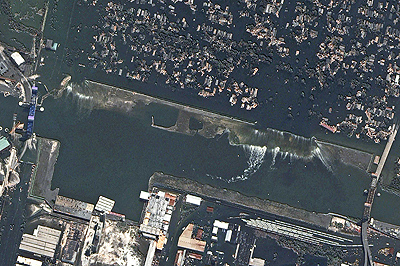Berkeleyan
 |
This levee break on the east side of New Orleans compounded the damage done by the thrashing Katrina gave the region. Berkeley engineers are now on site, lending expertise to a multi-entity investigation of levee failures in hopes of avoiding future tragedies of this type. (DigitalGlobe/ Eurimage) |
'Getting to the truth' about levee failures
Berkeley engineers, after Katrina, begin to investigate the cause of breaches
![]()
| 05 October 2005
Civil engineers from the Berkeley campus have arrived in New Orleans as part of an independent team of researchers investigating levee failures in the wake of Hurricane Katrina.
The research team, funded by the National Science Foundation (NSF), is led by Ray Seed, professor of civil engineering and principal investigator of the NSF grant. The team will collaborate closely with groups from the U.S. Army Corps of Engineers and the American Society of Civil Engineers (ASCE), sharing data and resources, but each team's findings will be developed independently.
"Many public statements have been made in recent weeks about the causes of the levee breaches," said Seed. "The goal of our efforts is to get to the truth of what actually happened so that we can learn from these failures and identify where we need to improve our defenses."
The first major site investigation for the NSF-funded team began in New Orleans on Sunday, Oct. 2, and additional team members will rotate in as project conditions dictate. The three investigative teams (from the NSF, ASCE, and Army Corps) will work together on site as long as necessary to collect and analyze data.
Other Berkeley researchers involved in this levee investigation are faculty members Robert Bea, Jonathan Bray, and Juan Pestana, and graduate student Rune Storesund, all from the Department of Civil and Environmental Engineering. They are being joined by a dozen national experts in levees and post-disaster forensic investigation, including faculty and researchers from other universities, experts from state and federal agencies, and independent consultants.
The researchers studying the levee failures expect to identify and prioritize the steps that need to be taken to help restore the critical societal infrastructure that was damaged by Katrina and to extend lessons learned to other regions of the United States.
Other Berkeley efforts to study aspects of Hurricane Katrina's aftermath are under way, including a project led by Karlene Roberts, professor of organizational behavior in the Haas School of Business, to analyze societal dynamics and such critical response organizations as the Federal Emergency Management Agency (FEMA). Bea, of civil engineering, is leading a separate initiative to study the performance of coastal and offshore facilities, including refineries, oil platforms, and pipelines.
When ready, the findings of these investigations will be made available to the public.

